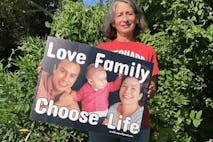
Texas city of Tira becomes 91st 'Sanctuary City for the Unborn' in US
Mark Lee Dickson
·
Canada’s Trudeau administration pushes abortion as ‘a tool to end poverty’
Marie-Claude Bibeau, the Canadian Minister of International Development, made some eyebrow-raising remarks at a London Family Planning Summit this week regarding the Canadian government’s efforts to promote abortion and contraception in other countries. According to Townhall.com, “Bibeau was responding to a letter from Canadian bishops strongly objecting to this ‘attempt to insinuate abortion advocacy in Canadian foreign policy'” when she stated the following in an interview with CTVNews:
Contraception and even abortion is only a tool to end poverty. We … have to give [women] the control over their lives. So we shouldn’t look at contraception as the objective…. This is only a tool to reduce poverty and inequality and to make an impact in terms of development and peace and security in the world.
Bibeau believes the availability of contraception and abortion will “empower women.”
Melinda Gates, wife of Microsoft founder Bill Gates, likewise emphasized at the Summit her belief that contraception is an “anti-poverty” tool. Live Action News’ Cassy Fiano noted that “contraceptives don’t actually solve any of the problems these women are facing. In many cases, women are still forced to choose between their children and their careers, and many women still live in poverty.” Promoting contraception and abortion does nothing to address unfortunate cultural attitudes toward women and children.
The Canadian Conference of Catholic Bishops believes there is a multi-million dollar discrepancy between the amount the Trudeau administration has pledged toward ‘family planning’ and the amount pledged toward “severe food shortages” in various African countries. (For its part, the Trudeau administration disagrees.) According to Townhall, Canada has just pledged another $18 million toward “abortion and family-planning services” in Mozambique.
Article continues below
Dear Reader,
In 2026, Live Action is heading straight where the battle is fiercest: college campuses.
We have a bold initiative to establish 100 Live Action campus chapters within the next year, and your partnership will make it a success!
Your support today will help train and equip young leaders, bring Live Action’s educational content into academic environments, host on-campus events and debates, and empower students to challenge the pro-abortion status quo with truth and compassion.
Invest in pro-life grassroots outreach and cultural formation with your DOUBLED year-end gift!
However, pushing contraception and abortion in developing countries is not viewed favorably by the African people, says the founder of Culture of Life Africa, Obianuju Ekeocha. She told the BBC, “I don’t think that any Western country has a right to pay for abortions in an African country especially where a majority of people don’t want abortion,” calling it “a form of ideological colonization.” This isn’t the first time Ekeocha has lambasted Western countries’ push for abortion and contraception in developing countries. In 2016, she decried the pro-abortion push of the United Nations and Amnesty International at the UN, saying, “Most of the African communities actually believe by their traditions and their cultural standards that abortion is a direct attack on human life,” and added that pushing pro-abortion ideals on these communities would be telling a woman that “what her parents, her grandparents, her ancestors taught her is actually wrong. You’re going to have to tell her that they have always been wrong, and that, madame, is colonization.”
On rare occasions, some abortion advocates have been startlingly honest, contradicting the façade that promoting abortion in developing countries is for “women’s empowerment.” In 2011, former Planned Parenthood World Population executive director Norman Fleishman expressed support for President Obama’s birth control mandate, writing in an op-ed, “Ah, how I remember ‘Every child a wanted child,’ our motto at Planned Parenthood. And I do welcome this legislation. […] Unless we act (this legislation, along with China’s ‘one child’ policy, is a start), the world is doomed to strangle among coils of pitiless exponential growth.”
If curbing population growth is the true, ulterior motive of worldwide abortion promoters, their efforts appear to be misplaced. More recent reports have begun sounding the alarm of a possible “population implosion,” due to countries’ thin numbers among younger generations, which are needed to sustain larger, aging populations.
Live Action News is pro-life news and commentary from a pro-life perspective.
Contact editor@liveaction.org for questions, corrections, or if you are seeking permission to reprint any Live Action News content.
Guest Articles: To submit a guest article to Live Action News, email editor@liveaction.org with an attached Word document of 800-1000 words. Please also attach any photos relevant to your submission if applicable. If your submission is accepted for publication, you will be notified within three weeks. Guest articles are not compensated (see our Open License Agreement). Thank you for your interest in Live Action News!

Mark Lee Dickson
·
Analysis
Cassy Cooke
·
International
Cassy Cooke
·
International
Angeline Tan
·
International
Bridget Sielicki
·
Guest Column
Elizabeth Sutcliffe
·
Human Interest
Kelli Keane
·
Activism
Kelli Keane
·
Politics
Kelli Keane
·
Human Interest
Kelli Keane
·
Abortion Pill
Kelli Keane
·